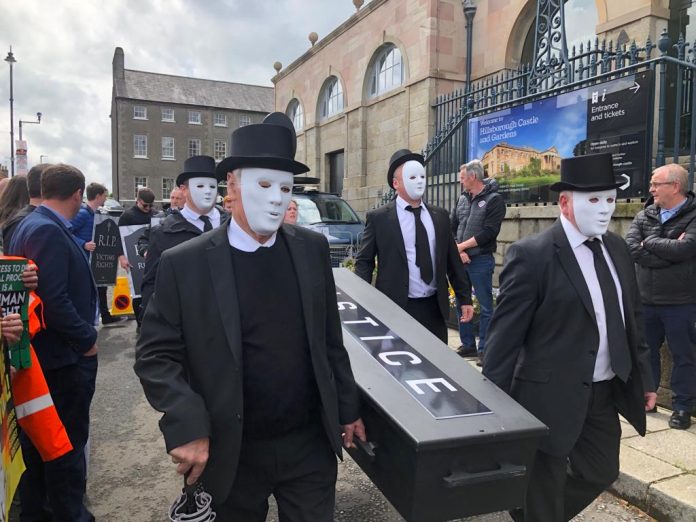The seventh hearing day of the judicial review against the Legacy Act started with the final oral submissions of barrister Tony McGleenan KC acting on behalf of the UK Government. Following on the previous legal gymnastics to try to justify the compatibility of the Legacy Act with human rights and the rule of law, one of the points in which the King’s Counsel relied upon was the discretionary powers the ICRIR will allegedly have to meet victim’s needs and comply with legal obligations. He said that the “granular detail” of how the system will work has not been specified in the Act because it will be a matter for the ICRIR to decide on the specific approach regarding, for instance, public hearings and the effective participation of victims, which is a requirement of Article 2 ECHR. We are expected, it seems, to just wait and see, to have faith on a system designed by the very Government that have continuously fought victims and survivors seeking the rights they are entitled to by law.
Another striking point of the Government was regarding the consultation and the survey of the ICRIR. Mr. McGleenan said that those are open to the applicants to raise the issues they brought to this litigation, adding that there is “no reason” why the issues cannot be resolved through that channel considering that Declan Morgan “is listening”.
The lawyer then went over some of the key points raised by the lead cases during the course of this legal challenge. The Government is of the view, for example, that the Gilvary case is in itself “problematic” and should not be considered for the purposes of the judicial review in regards of freedom from torture enshrined in Article 3 ECHR, despite the strong suspicion of the involvement of state agents on the case. On the Fitzsimons case, counsel for the Government said that the Legacy Act is a “corrective action of parliament” to restore the Carltona principle – a legal doctrine which allows a Secretary of State to delegate powers to an official in their department. As such, the barrister added that the Parliament was legally entitled to shut out compensation claims by those unlawfully interned in the 70s including Gerry Adams and also others such as Fitzsimons, which the Government sees as “collateral impact”.
The High Court then heard the last submissions of the applicants on reply to the respondent. Karen Quinlivan KC highlighted that there is no justification for immunity on the Government’s arguments for reconciliation, national security interests or public safety – how is public safety pursued by granting immunity to people who committed murder and other serious offences? She also raised the fact that even the Commissioner for Investigations at the ICRIR, Peter Sheridan, has accepted what Mr. McGleenan denied in court last week – that is, that the Legacy Act was designed by the Government to protect former British soldiers.
Barrister Malachy McGowan made the point that the Legacy Act was not founded in the Good Friday Agreement, but that freedom from torture is part of the civil rights mentioned in it. He said that, since the act of torture is “repugnant to the common law” and jus cogens in international law, the fact that the Legacy Act provides immunity and therefore impunity for such crimes is in itself objectionable. Mr. McGowan finished by bringing up the first point raised by the UK Government – we were told that this challenge was “ambitious and novel”, but what is novel is a legislative operation to allow torturers’ impunity, which is, he said, a profound assault on the rule of law.
John Larkin KC pointed at several relevant legal developments that the responded seemed to have forgotten to mention in their peculiar chronology of events that actually contradict the Government’s arguments. He also said that it has been abundantly clear since the beginning that the focus of the new legislation was on veterans and the public image of the State. Mr. Larkin also contradicted the Government’s deceptive interpretation of the views of the Committee of Ministers, which he rightly described as using “diplomatic language screaming at the top of its collective voice against Legacy legislation”.
The barrister for the lead cases finished his reply by going back to the beginning of his oral submissions last week, that is, to the human beings behind the legal challenge. He reminded the court that the applicants’ unique experiences captured in their affidavits share an agonising commonality with other victims at the heart of this case, which refer to the aspect of human dignity. Citing Seamus Heaney, Mr. Larkin concluded that the applicants are not seeking for legislation to wipe all their tears – they are seeking that legislation “will not cause them to weep again and impose, as this Act does, a particularly vicious form of secondary victimisation by shutting out emphatically any prospect of redress or justice.”
Judgement is reserved.














